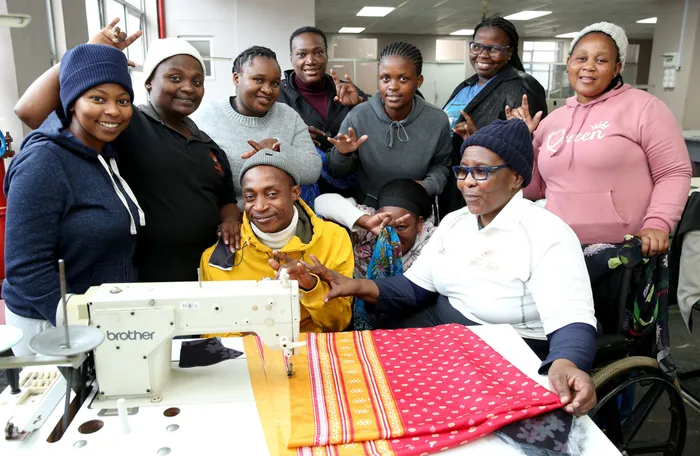New sewing training centre to empower the deaf

At the KZN Blind and Deaf Society where a sewing training centre for deaf people opened 2 weeks ago are, back, from left, Fundiswa Jubase, Lusanda Zawuka, Noluyolo Gugwana, Sbongile Mcanyana, Ntombiyenkosi Gazu, Nontsikelo Dlamini, Nolwazi Gebashe and, seated, Lindokuhle Mzobe, Thobeka Mbelu and teacher Busisiwe Nxumalo. Picture: Shelley Kjonstad/Independent Newspapers
Durban — The KZN Blind and Deaf Society has launched a sewing training centre for people with hearing disabilities.
The state-of-the-art facility at the society’s head office in Durban is designed to empower members of the deaf community by providing them with the skills, resources and support necessary to excel in the field of sewing and fashion.
The society caters for the blind and deaf community and reaches poor, unemployed blind and deaf people living in rural areas who do not have the means to access rehabilitation services.
Veetha Sewkuran, president of the society, said they wanted to create an environment that fostered creativity, skills development and independence for the deaf.
“The sewing training centre offers a unique opportunity for members of the deaf community to acquire valuable sewing skills, paving the way for new career opportunities and personal growth,” said Sewkuran.
“We are very excited about this new project, as many of our unskilled and unemployed deaf youth will be placed in jobs in the clothing and textile industry.”

The sewing training centre, in partnership with the Apparel and Textile Association of South Africa (Atasa), will run 12-week courses in sewing and a seven-month course for sewing machine mechanics.
The centre offers a specialised curriculum designed to accommodate the learning needs of the deaf and employs sign language and visual aids to ensure effective communication and learning.
The facility is equipped with the latest sewing machines and tools, enabling students to master the art of sewing and garment construction.
A team of experienced instructors from Atasa will oversee the development and training of the students.
Sewkuran said the society was committed to helping graduates of the training centre find employment in the fashion and textile industry.
“Ten people are trained at a time during the 12-week course, while two attend training in how to repair sewing machines. The course is free.
“We currently have people aged between 25 and 45. Next year, we would like to get those who have finished school but are struggling to get into tertiary institutions,” she said.

Nonsikelelo Dlamini, 45, of Ntuzuma, said she felt motivated and appreciated the opportunity she was given when she was selected to be a part of the training programme.
“I enjoy sewing, but did not have the funds to pay for lessons to learn to sew. When I finish my sewing course I would like to buy my own machine and start my own business and sell clothes in my community. This would help support me financially.
“Prior to starting the course, all I knew was basic hand stitching. I now have the opportunity to learn more and about how to use a professional machine,” said Dlamini.
In 2021 the society initiated a sewing room project to empower partially sighted and deaf persons by enhancing their sewing skills as well as finding employment. In addition, the project advocates for gender equity, with the focus on encouraging the women’s involvement in the province’s economy.
Sewkuran said they started off by sewing masks during Covid, and were now making bags, jackets and kimonos which they sold at markets.
Sunday Tribune